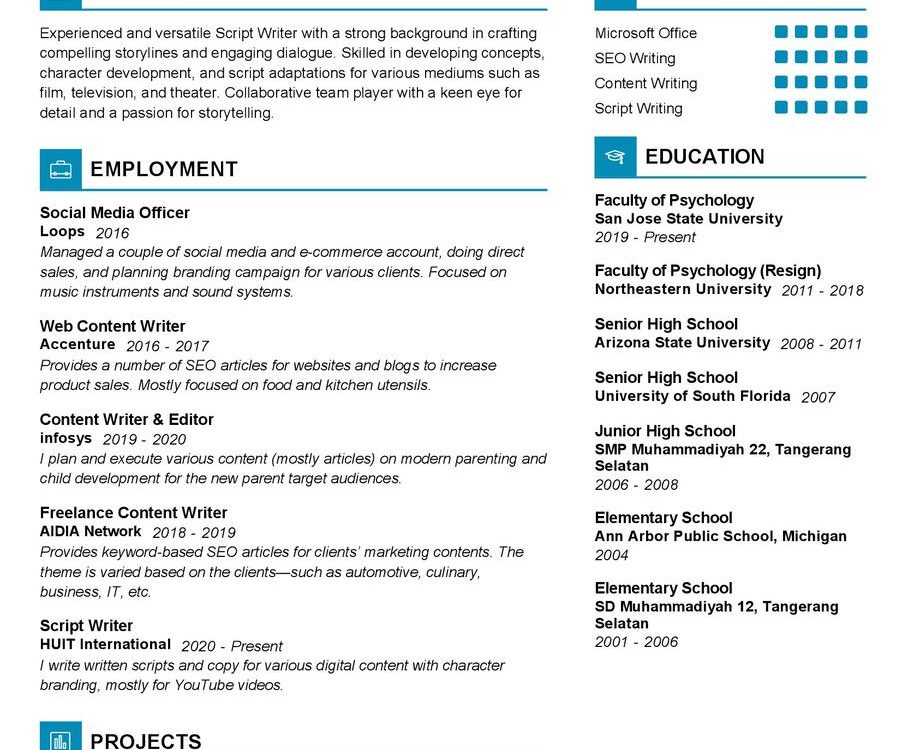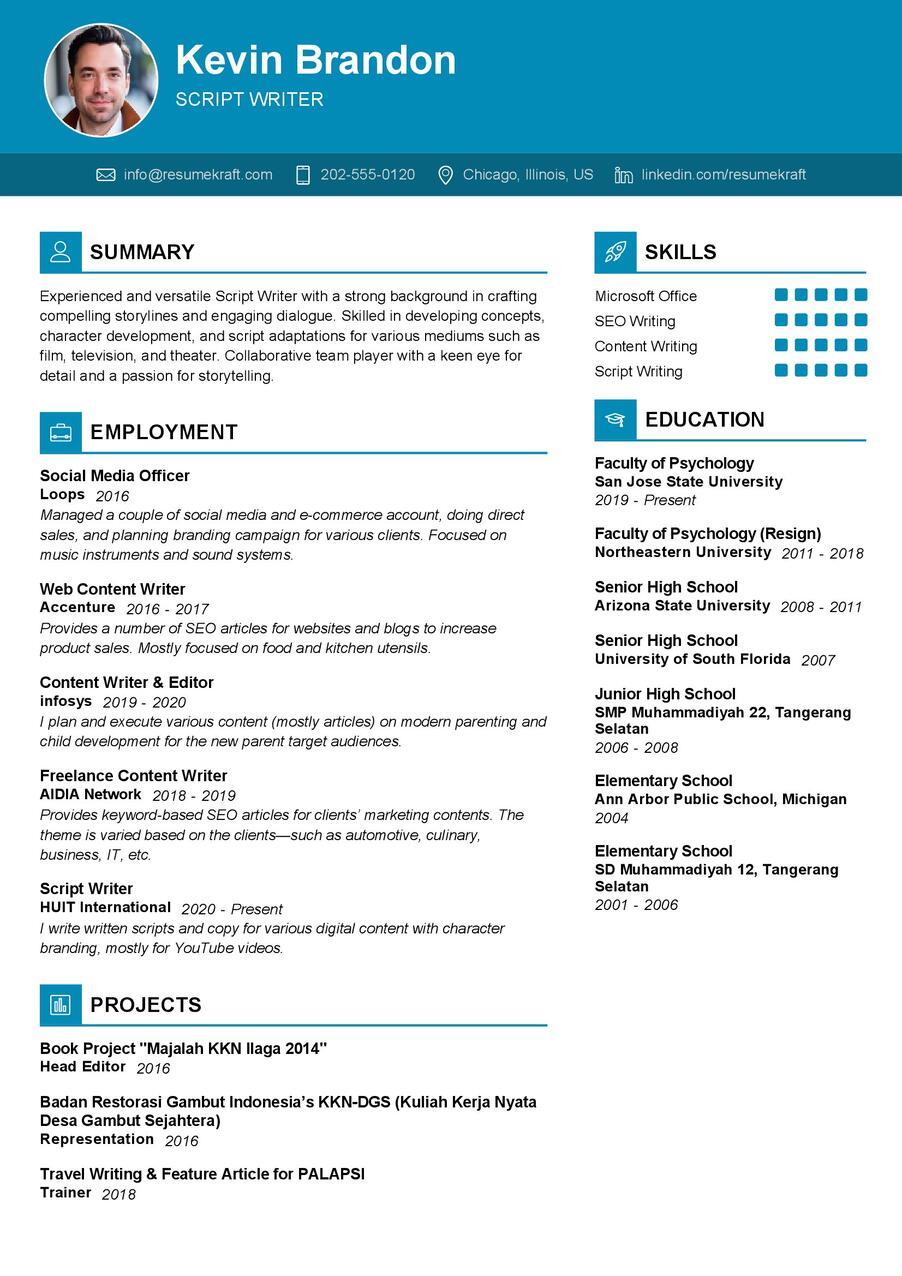Exploring the Art of Script Writing
Script writing is a captivating journey into the realm of storytelling, where words on paper come to life on the screen or stage. A Script Writer is a craftsman, weaving narratives that engage, entertain, and leave a lasting impact. In this exploration, we’ll dive into the intricacies of the Script Writer’s role, the essential skills and qualifications, and valuable tips for crafting a compelling script-focused CV.
Understanding the Role of a Script Writer
The role of a Script Writer goes beyond penning down dialogues; it’s about creating worlds, characters, and emotions that resonate with the audience. A Script Writer is the architect of a story, shaping its structure, pacing, and tone. Let’s delve into the multifaceted responsibilities of a Script Writer:
- Developing engaging and coherent storylines for various mediums, such as film, television, or theater.
- Crafting authentic and compelling dialogues that bring characters to life.
- Collaborating with directors, producers, and other team members to ensure the script aligns with the overall vision of the project.
- Adapting existing stories or concepts into script format, demonstrating versatility in storytelling.
- Conducting thorough research when creating scripts based on real events, ensuring accuracy and authenticity.
- Revising and polishing scripts based on feedback and collaboration with the production team.
Being a Script Writer is about more than just writing; it’s about creating experiences that captivate audiences and stand the test of time.
Qualifications and Skills for Aspiring Script Writers
Embarking on a career as a Script Writer requires a combination of education, skills, and a passion for storytelling. Let’s explore the key qualifications and skills that can set you on the path to success:
- A degree in Film Studies, Creative Writing, or a related field, showcasing a solid foundation in storytelling techniques.
- Strong storytelling skills, with the ability to create compelling narratives that resonate with diverse audiences.
- Excellent command of the English language, with a focus on dialogue construction and scene-setting.
- Adaptability to different genres and mediums, showcasing versatility in scriptwriting.
- Understanding of industry-standard scriptwriting software, such as Final Draft or Celtx.
- Attention to detail, ensuring consistency in character development, plot arcs, and overall story structure.
- Collaborative spirit, able to work effectively with directors, producers, and other team members.
These qualifications and skills form the foundation upon which a successful career in scriptwriting is built.
Crafting a Script Writer CV
Your Script Writer CV is your ticket to showcasing your talent and landing exciting projects. Let’s explore how to craft a standout script-focused CV:
- Introduction: Start with a captivating summary that highlights your passion for storytelling and your experience in scriptwriting.
- Education: Detail your educational background, emphasizing relevant degrees or certifications in film studies or creative writing.
- Skills: Create a dedicated section showcasing your scriptwriting skills, software proficiency, and any additional talents, such as adapting to different genres.
- Experience: Provide a comprehensive list of your scriptwriting experience, including specific projects, genres, and any awards or recognitions received.
- Portfolio: Consider including a portfolio section with samples of your work or links to produced scripts, giving employers a tangible sense of your writing style.
- References: If possible, include references from directors, producers, or colleagues who can speak to your scriptwriting abilities.
Remember, your CV is not just a document but a showcase of your storytelling prowess, so make it engaging and memorable.
Preparing for the Script Writer Interview
Securing an interview as a Script Writer is an opportunity to further demonstrate your passion and expertise. Here are some tips to ace the Script Writer interview:
- Research: Familiarize yourself with the production company or project you’re interviewing for, showcasing your genuine interest.
- Portfolio Discussion: Be ready to discuss specific projects in your portfolio, highlighting challenges faced and solutions implemented.
- Collaboration: Emphasize your ability to collaborate with directors, producers, and other team members to bring a script to life.
- Adaptability: Showcase your adaptability to different genres and your willingness to take on new challenges.
- Passion: Let your passion for storytelling shine through; after all, it’s the heartbeat of scriptwriting.
Approach the interview as an opportunity to share your love for storytelling and your unique approach to scriptwriting.
Key Takeaways for Your Script Writer CV
As you embark on the journey to craft your Script Writer CV, keep these key points in mind:
- Highlight your passion for storytelling in your introduction to captivate employers from the start.
- Emphasize your versatility by showcasing experience in various genres and mediums.
- Include a portfolio section to provide tangible examples of your scriptwriting expertise.
- Prepare for the interview by researching the company and being ready to discuss specific projects in your portfolio.
Your Script Writer CV is not just a document; it’s a narrative of your storytelling journey. Best of luck in showcasing your talent and landing exciting scriptwriting opportunities!
Finally, feel free to utilize resources like AI CV Builder, CV Design, CV Samples, CV Examples, CV Skills, CV Help, CV Synonyms, and Job Responsibilities to create a standout application and prepare for the [Script Writer] job interview.


